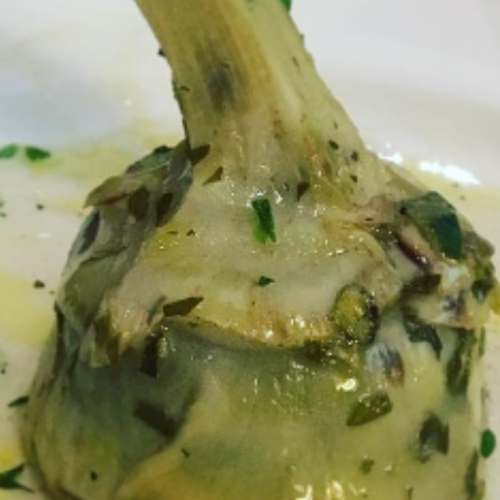Step-by-Step Instructions
Step 1: Prepare the Artichokes
Trim the Artichokes: Begin by pulling off the tough outer leaves until you reach the more tender inner leaves.
Trim the Stem: Leave about 1 inch of the stem. Peel away the tough outer layer of the stem with a paring knife.
Prepare the Hearts: Cut about 1 inch off the top of each artichoke, then scoop out the fuzzy choke in the center with a spoon (if your artichokes are large and mature).
Prevent Browning: Rub the artichokes with lemon halves and immediately place them in a bowl of water with lemon juice to prevent browning.
Step 2: Season the Artichokes
Make the Herb Mixture: In a small bowl, combine parsley, mint, minced garlic, salt, and pepper.
Stuff the Artichokes: Using your fingers, gently open the leaves of each artichoke and stuff the herb mixture into the center and between the leaves. This infuses the artichokes with wonderful flavors as they cook.
Step 3: Braise the Artichokes
Arrange in the Pan: Place the artichokes stem-side up in a large saucepan that can hold them snugly in a single layer.
Add Olive Oil and Water: Drizzle the olive oil over the artichokes, then add ½ cup of water to the pan.
Cover and Cook: Cover the saucepan with a lid and simmer over low heat for about 30 minutes, or until the artichokes are tender when pierced with a fork. (From my own personal experience, I find that keeping the heat low helps to soften the artichokes without overcooking them.)
Step 4: Serve
Rest the Artichokes: Allow them to stand for 5 minutes before serving.
Plate: Serve warm or at room temperature, with a drizzle of the remaining cooking liquid for extra flavor.
Variations and Tips
Variation with Breadcrumbs: Add a few tablespoons of breadcrumbs to the herb mixture for a slightly crunchy texture.
Vegan Option: The recipe is naturally vegan, so no modifications are needed.
Low-Sodium: To reduce sodium, use less salt in the herb mixture and add more fresh herbs for flavor.
Tip for Choosing Artichokes: Look for fresh, tightly closed artichokes, as they are less likely to have tough outer leaves.
